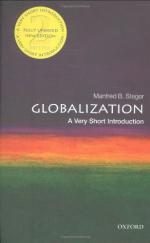|
This section contains 9,200 words (approx. 31 pages at 300 words per page) |

|
Since the early 1960s, mounting empirical pressure has forced sociology to abandon the assumption that national societies could be understood without looking beyond their borders. The nation-state remains a crucial unit of analysis, but it must be analyzed as intertwined with the operations of a larger global social system. Global flows of culture, technology, people, goods, and capital determines to an ever larger degree how societies change at the national level. The dynamics of transnational social, economic and political structures have become a focus of study in their own right.
The value of international trade has grown more rapidly than the value of goods and services produced and sold within national boundaries. Manufacturing means assembly of components from around the globe. Electronic youth culture in the United States revolves around Japanese cartoon characters, while a generation of Third World television...
|
This section contains 9,200 words (approx. 31 pages at 300 words per page) |

|


